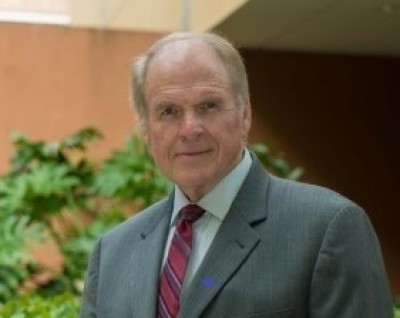Healing the big hole in America's heart
There is a hole in the heart of America: the absence of the sense of God’s transcendence.

In our effort to fill the crater we have replaced our awe and reverential fear of Him with gutter trash. Hence, the cultural exploitation and coarseness of our age, from “Cuties” to the F-word becoming the mantra of secular liturgy.
God the errand boy is still around. Fetch us a healing... wealth... happiness, we demand. But the errand boy deity is not God the Father, and we miss Abba terribly.
Edna St. Vincent Millay wrote of the pain of loss: “Where you used to be, there is a hole in the world, which I find myself constantly walking around in the daytime, and falling in at night.”
The danger is that no matter how much people try to reject the transcendent Lord, the more they need transcendence — in “daytime”, and especially at “night.”
Jordan Peterson faces this frankly if not intentionally, in his book, 12 Rules for Life: An Antidote to Chaos. In his Introduction, Dr. Norman Doidge, an MD, says that without the belief in a transcendent ideal, we are “unchaperoned,” and “left to our own untutored judgment, we are quick to aim low and worship qualities that are beneath us.” Dr. Doidge also points to the “hunger among many younger people for rules, or at least guidelines,” and says there is “good reason.” They are the first generation to have been educated in a system that holds that morality is relative, but also in the contradictory idea that “one group’s morality is nothing but its attempt to exercise power over another group.”
The outcome, according to Dr. Doidge is that “many people cannot tolerate the vacuum— the chaos — which is inherent in life, but made worse by this moral relativism; they cannot live without a moral compass, without an ideal at which to aim in their lives.”[1]
Infant America was birthed with a heart full of a terrifying sense of God’s majesty. The preaching of the likes of Jonathan Edwards in the First Great Awakening (1730-1740) thundered with it in sermons like, “Sinners in the Hands of an Angry God,” and “The Justice of God in the Damnation of Sinners.”
Even a hefty percentage of Evangelicals now blush at the mention of the old themes that gave rise to Thomas Jefferson’s Preamble to the Declaration of Independence: It is the transcendent One who has given us our rights... Government leaders and the people they serve are all accountable to the transcendent Lord.
One of the consequences of forgetting the transcendence of God is that the state tries to impose itself as transcendent.
America won’t be immune. No matter what she professes, the secular state is driven by the spirit of antichrist — the spirit of opposition to the true Christ and imposition of itself upon His Throne.
Further, because of the absence of the sense of transcendence from the human and national heart, culture takes on ugliness rather than beauty. Hence contemporary coarseness.
The ancient boundaries of sanctity are chopped down when there is that hole in the heart of a nation. Nothing is sacred; therefore, everything is exploitable. A lack of reverence for God means a lack of reverence for God’s creation.
Because of the hole in the heart, transcendent value is lost. The only value is the pleasure or profit derived from the object of desire.
America, like the individuals who comprise it, needs to be reborn. The first birthing occurred after a healthy gestation in the womb of the Great Awakening. The nation needs gestational revival again. But revival doesn’t come through governments or any other institutions of human contrivance, but through the genuine church, which is Jesus-centered, Spirit-energized, Word-anchored, and Kingdom-envisioning.
Here are five actions through which the biblically based church can help mend the hole in the heart of the nation.
1. The pulpit must recover the doctrine of sin. Whatever Became of Sin? asked psychiatrist Karl Menninger in 1973. It’s time for a thorough examination of the spiritual cancer killing whole societies, and the antidote.
2. To help heal the hole in the nation’s heart, her pastors must also bring a new emphasis on judgment and accountability, without which law is meaningless. God’s justice is as certain as His mercy and His mercy as absolute as His justice.
3. Churches must heed Dietrich Bonhoeffer’s warning about “cheap grace” that he described as “the preaching of forgiveness without requiring repentance, baptism without church discipline, Communion without confession, absolution without personal confession... grace without discipleship, grace without the cross, grace without Jesus Christ, living and incarnate.”
4. Therefore, churches should embrace the whole of Jesus’s Great Commission (Matthew 28:18-20) and make disciples: people whose worldview and behavior are biblically shaped.
5. Praise and worship leadership should recover the majestic, the overwhelming holiness and splendor of God, guiding us to see Him as the focus of adoration.
No political party or movement can heal the hole in the national heart. This is the kairos-season for the biblical church to experience the freshening of the Holy Spirit in revival, and infuse that in the spirit, soul, and body of the nation.
This is why the health of the nation is in direct ratio to the health of the church within the nation.
[1] Jordan Peterson, 12 Rules for Life: An Antidote to Chaos (Toronto: Random House Canada, 2018), pp. viii, xviii, xx. Italics in original.
Wallace Henley is a former pastor, White House and congressional aide, and author of more than 25 books. His newest is Two Men From Babylon: Nebuchadnezzar, Trump, and the Lord of History, published by Thomas Nelson.




























